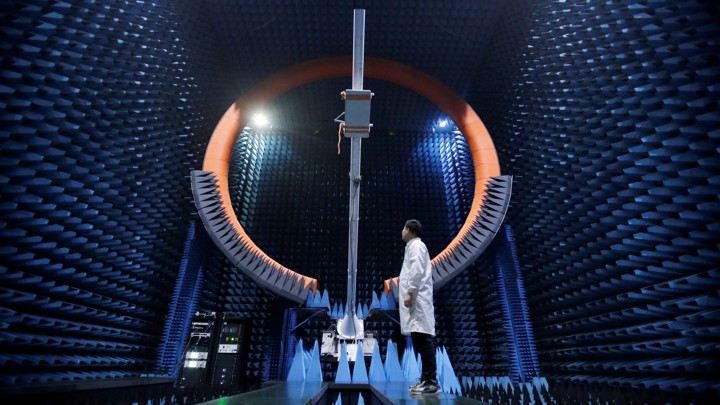begin quote from:
Democrats Are Avoiding the China Question
Listening to the Democratic candidates for president, you would probably not know that globalization, as it has existed for the past several decades, may soon cease to exist. Since at least the turn of the century, the close ties between the United States and China, which together constitute 40 percent of the world’s GDP, have bound the world economy together. But this deep interdependence—which is sometimes called “Chimerica”—may not survive Donald Trump. It’s not just his tariffs on Chinese goods, and China’s retaliatory tariffs on American products, which if not repealed will likely depress trade between the nations. Trump is also building a wall between China’s and America’s biggest companies. In May, his administration forced Google to stop supplying crucial software to Huawei, the world’s second-largest smartphone maker. China will likely respond by bolstering its own suppliers so it’s never at America’s mercy again.
The Atlantic’s Give-One, Get-One Sale
Send a subscription to a dad, grad, or any reader you’d like—and get a second subscription absolutely free.
The U.S.-China split is even influencing global travel. This week, China warnedits citizens against visiting the United States, and Chinese enrollment in American universities is dropping. Trump and Xi Jinping may be leading the world into an era in which money, goods, information, and people flow less freely across national borders than they have for the past quarter century. The headline of a recent op-ed by former German Foreign Minister Joschka Fischer calls this “The End of the World as We Know It.”
How do the major Democratic presidential candidates feel about this potentially epic shift? We don’t really know. They rarely bring it up on their own. Bernie Sanders says nothing about China on his website. Neither do Elizabeth Warren, Pete Buttigieg, Beto O’Rourke, Cory Booker, or Kirsten Gillibrand. All Joe Biden says about China on his website is that it’s “rising.” On hers, Amy Klobuchar pledges to “invest in diplomacy and rebuild the State Department and modernize our military to stay one step ahead of China.” Kamala Harris’s website says the United States should “work in lockstep with our partners” to confront “China’s unfair trade practices.” That’s about as substantive as it gets.
To be fair, presidential candidates tend to talk about what voters want them to talk about. And despite Trump’s trade war, Democratic voters are most concerned about health care, education, the environment, and abortion. When the Pew Research Center asked Democrats in January which issues should be a top priority in Washington this year, trade came in 17th out of 18.
Leading media outlets aren’t doing nearly enough to jump-start the conversation. CNN, MSNBC, and Fox have all hosted town halls in which moderators and potential voters ask the presidential candidates questions. Inmany of them, transcripts suggest, China hasn’t come up at all. As far as I can tell, Huawei hasn’t been mentioned once.
When the candidates are forced to discuss China, you can glimpse the faint outlines of a divide between the more left-wing and more centrist contenders. In an interview on PBS last year, Sanders said he “strongly supports” tariffs against China, but thinks “Trump gets it wrong in terms of implementation.” Warren has said that “tariffs are one part of reworking our trade policy.” By contrast, Buttigieg, in his MSNBC town hall, said “a tariff is a tax” that will make Americans “all pay, on average, 800 bucks more a year, starting now.” In hers, Harris also slammed the “Trump trade tax,” which means “we are paying more for washing machines and shampoos.” The implication is that unlike Sanders and Warren, Buttigieg and Harris don’t just oppose the way Trump has imposed tariffs. They oppose tariffs in general.
But the debate the candidates should be having—and media interviewers should be nurturing—is about much more than tariffs. It’s about whether and how to alter the terms of Chinese-American interdependence. Right now, Trump’s efforts to change the relationship seem likely to break Chimerica apart and end globalization in its current form. Yet most Americans haven’t heard a clear Democratic alternative.
There are three broad arguments that Democratic hopefuls could make. The first is that Trump is right to pressure China to open its economy to U.S. corporations, but that he shouldn’t do so unilaterally. Yes, Democrats might argue: Trump is right to demand that Beijing permit American companies to do business in China without forming joint ventures with Chinese counterparts. He’s right to demand that China do a better job of protecting intellectual property so Chinese companies can’t create cheap knockoffs of American goods. Where he’s wrong is in trying to accomplish all this on his own. In Beto O’Rourke’s CNN town hall, the former Texas representative brought forth the kernel of this argument. “When in the history of this country have we ever gone to war, a military fight or a trade war, without allies?” O’Rourke asked. “Because that’s exactly what we are doing now with China.”
The implication is that the U.S. should quickly settle its trade disputes with Japan, South Korea, and Europe. If they band together, the democracies can focus instead on pushing China to accept the responsibilities that come with being the global economic power that it is. In trade matters, China still portrays itself as a developing country, a status that allows it to protect Chinese companies and impose unfavorable conditions on Western firms that want to sell to Chinese consumers. The natural forum in which to pressure Beijing would be the World Trade Organization, which the United States could empower rather than trying to cripple, as Trump has.
For Democrats, such a strategy would make intuitive sense. In economics, as in war, Democrats tend to prefer multilateral to unilateral interventions, and to support international institutions that legitimize American power. Barack Obama’s administration was thinking in these terms when it tried to create the Trans-Pacific Partnership, which it hoped would create rules for trade and investment across Asia that China felt pressured to match. Politically, the current Democratic candidates probably can’t endorse the TPP, because sentiment in the party has shifted so far against the proposed agreement. But it’s easy to imagine the more moderate Democrats—Biden, Buttigieg, Harris, and O’Rourke—pursuing a modified version of Obama’s strategy of preserving the Chimerica relationship while making it work better for American businesses.
Secondly, Democrats could make a different, more radical, argument: Opening up China’s economy to American companies and American investment isn’t the answer at all. In this view, the larger problem at the heart of globalization is that big corporations can scour the world seeking the cheapest workers with the fewest labor and environmental protections.
By this logic, Democrats shouldn’t assemble foreign partners to achieve Trump’s current trade goals, because the goals themselves are wrong. America should only seek trade agreements with strong, enforceable labor and environmental standards, and perhaps even some form of global minimum wage. The University of Rhode Island historian Erik Loomis has proposed that future trade deals create international courts that, rather than allowing corporations to sue governments for impeding investment and trade, as the TPP would have, allow citizens to sue corporations for mistreating workers or harming the environment.
The goal of this approach would be less to recalibrate the relationship between America and China—which now possesses its own “Rust Belt” as corporations shift to poorer countries with lower wages——than to recalibrate the relationship between corporations and workers. America would focus not on pushing China to better protect the intellectual property of American businesses but to allow independent labor unions so American and Chinese workers can together pressure their employers to raise wages and improve working conditions. Democrats, wrote the activist Tobita Chow in a plea to the 2020 contenders, should “recognize Chinese workers as potential comrades in a shared struggle against global corporate power.”
For anti-corporate Democrats such as Sanders and Warren, Chow’s argument might constitute a natural international extension of their domestic agenda. But this more dramatic rewriting of globalization’s rules is likely harder to achieve. Permitting more foreign investment doesn’t threaten the Chinese government’s hold on power; permitting independent labor unions could. Beijing surely remembers that Solidarity, the independent labor union led by Lech Walesa, was what helped bring down the Communist government in Poland. Sanders and Warren are not Trump-style hyper-nationalists. They don’t want to undo globalization; they want to stop corporations from defining it. But the more ambitious your goals for a trade deal, the harder that deal is to reach, which for Sanders and Warren may be an acceptable risk. If America and China can’t reach an agreement, the tariffs remain—an outcome that the two liberal senators appear more comfortable with than their more centrist opponents.
The third Democratic approach for remaking Chimerica would be, politically, the easiest. It’s to focus not on China but on America. Instead of decrying the Made in China 2025 initiative, in which Beijing subsidizes crucial emerging industries such as robotics and green energy, the MIT economist David Autor has suggested that the U.S. adopt something similar—for instance, by dramatically boosting investment in the National Science Foundation and the National Institutes of Health. Democrats could frame their openness to immigration as a way to bring in the talent necessary to compete with China. And they could propose infrastructure investments that, for instance, accelerate America’s transition to 5G. Rather than breaking up Chimerica, the United States would strengthen its competitive position within the relationship by making changes at home.
The third option isn’t incompatible with the first or second one. But so far, it’s hard to know which approach the Democratic candidates prefer, because while they are laying out proposals for expanding health-care coverage, making college cheaper, saving abortion rights, and converting to green energy, they are barely debating the U.S.-China relationship at all.
When the primary debates begin, at the end of this month, the networks must pin the Democratic candidates down. If voters go to the polls early next year knowing nothing about how the Democratic contenders envision the future of a relationship that for decades has anchored the world as we know it, those candidates and the media will both have failed.


No comments:
Post a Comment